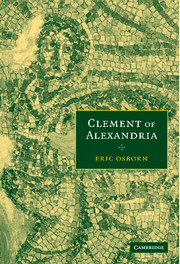Book contents
- Frontmatter
- Contents
- Preface
- List of abbreviations
- 1 Life and works
- PART I DIVINE PLAN/ECONOMY
- PART II DIVINE RECIPROCITY
- PART III FAITH AND SALVATION
- Conclusion
- Appendix: Irenaeus and Clement
- Select Bibliography
- Subject index
- Citations from Clement
- Citations from the Bible
- Citations from ancient authors
PART II - DIVINE RECIPROCITY
Published online by Cambridge University Press: 06 July 2010
- Frontmatter
- Contents
- Preface
- List of abbreviations
- 1 Life and works
- PART I DIVINE PLAN/ECONOMY
- PART II DIVINE RECIPROCITY
- PART III FAITH AND SALVATION
- Conclusion
- Appendix: Irenaeus and Clement
- Select Bibliography
- Subject index
- Citations from Clement
- Citations from the Bible
- Citations from ancient authors
Summary
INTRODUCTION TO PART II: THE MYSTERIES OF LOVE, RECIPROCITY AND PROLIFERATION
The centre of Clement's understanding of God is the reciprocity of father and son. This is the first ellipse, with the two foci being father and son. The second ellipse has, as its foci, God and the human person, whose reciprocity culminates in vision ‘face to face’. Finally, the third ellipse is the reciprocity of man with man in godlike forgiveness. These themes spring from John (e.g. 15 and 17) and 1 John 4.
Clement's fascination with the idea of reciprocity is evident in Stromateis VII where he quotes two jokes. In ridicule of superstition, he points to the alleged miracle of a mouse eating through a sack and a second miracle of a snake coiled around a pestle. Arcesilaus had pointed out that it would have been more of a miracle if the sack had eaten the mouse; Diogenes had similarly claimed that it would have been a greater miracle for the snake to have been erect and the pestle to have been coiled around it (7.4.24, 25).
Clement's first reciprocity is the relation between the son and the father; from the son, the sage learns of the higher cause, the father of the universe (7.1.2). A parallel problem was found in Platonists like Moderatus and Alcinous, who had a duplicity in their first principle. The one was both simple and transcendent, and multiple and inclusive. Plotinus later separates the two divine minds. Clement does not.
- Type
- Chapter
- Information
- Clement of Alexandria , pp. 107 - 110Publisher: Cambridge University PressPrint publication year: 2005

